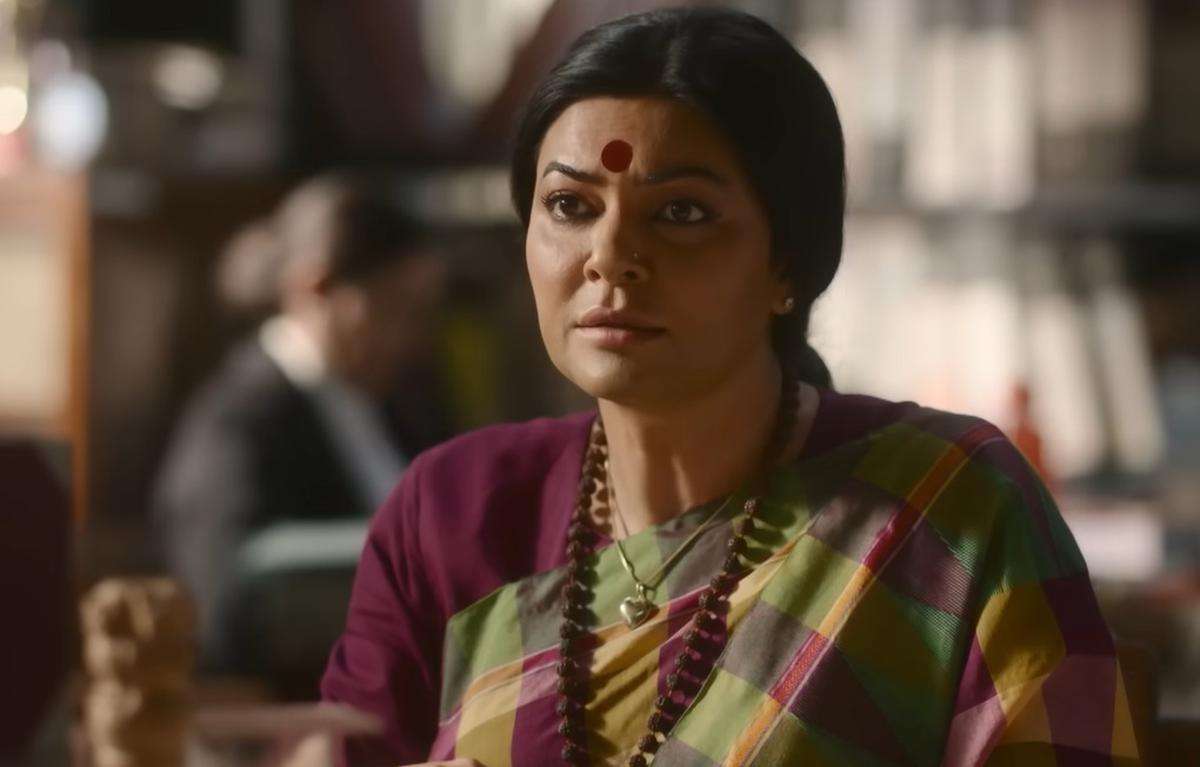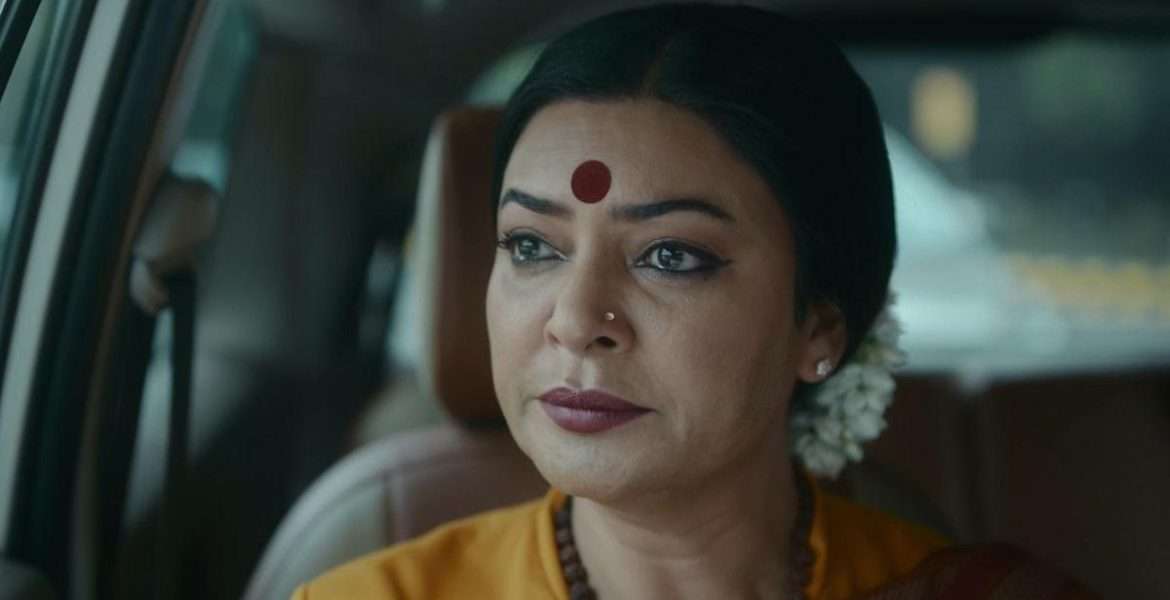The series Taali (2023) consists of six episodes and revolves around the many struggles of Shreegauri Sawant (Sushmita Sen) – a transgender activist from Mumbai – to establish her identity and advocate for transgender rights. Directed by Ravi Jadhav and created by Arjun Singgh Baran and Kartik D Nishandar, Taali (2023) can be divided into three segments: Identity, Survival, and Equality – the three major phases of Gauri’s life.
Identity:
Gauri was born as Ganesh in a middle-class Marathi family who were conditioned by our society’s stereotypes. Gender isn’t biological, but it’s a construction of our community. The traits a boy or a girl should exude are decided by our society, but Gauri was different in this constrained society. While her friends aspired to be doctors and engineers, she aspired to be a mother and adorned herself with her mother’s ‘bindi,’ ‘chunri.’ Her father could never accept her for who she was, and she was othered at every step by society. Yet she took pride and embraced her identity, which till today infuses hope in all the transgender people of our country to fight against the scorns inflicted upon them.
Survival:
In Taali (2023), Ganesh’s struggle for survival begins after his mother’s death. His mother is the only person who understands his inner urge to be Gauri. After her loss, Ganesh and his father, whom he addressed as Dada, were two misfits for each other. Like the prejudiced society, his authoritarian Dada tried to mold him into a typical boy. Dada took Ganesh to a doctor because, for people like him, this was some kind of disease, and what follows is a fascinating conversation between Ganesh and the doctor, which will linger in my mind for a long time.
Ganesh opens up to the doctor by saying he doesn’t like the female touch but has a strong affinity towards the male touch. The doctor instantly perceives him as ‘different.’ Ganesh retorts by asking why the doctor keeps a goldfish in his aquarium, and the doctor replies that it looks ‘different.’ Now Ganesh reflects upon the bitter irony and wonders how it’s okay to keep a fish that is different, but it isn’t okay to accept a person who is considered different.
Recommended Read: Lee Chang-dong’s ‘Oasis’ and the Eligibility of Love
People of this society always flaunt when they possess something peculiar or unfamiliar. However, when it comes to accepting someone different, they are unfortunately still stuck in their age-old beliefs. As the series unfurls, we see Ganesh’s journey to be Gauri. Soon, Ganesh leaves his house and moves to Mumbai. From standing in traffic signals and begging for money to building a community and educating them, protecting them acting as their shield, Gauri soon became the mother, aka Amma, for thousands of transgender people and abandoned children across the country.
Later, in 2000 Shreegauri Sawant founded ‘Sakhi Char Chowghi Trust.’ The NGO promotes safe sex, provides counseling to transgender people, and is a haven for people who have HIV/AIDS. She also runs “Aaji Cha Ghar,” another NGO that shelters the children of sex workers. A woman who was discarded by her society dedicated her life to serving the dejected and the deprived. Her tale of survival is an inspiration for not only transgender people but also the LGBTQ community to break free from their shackles and let society know that they can live life on their terms.
Equality:
The people of her community didn’t initially accept Gauri until she underwent gender affirmation surgery. There is a particular sequence in the series where Gauri has to stand in a queue divided into male and female, and we see her standing between the two lines. That whole sequence reflects her dilemma while fighting to fit into this society. Another powerful sequence in the series is Gauri’s protest against the hospital, which kept her friend’s corpse not on a stretcher but on the floor in front of a toilet.

Yet Gauri didn’t give up till she received a formal apology letter from the Dean of the hospital. These events were incidental to Gauri’s big step of filing a petition to the Supreme Court to recognize transgender as the third gender in this country (NALSA case of 2014). The subsequent judgment by Supreme Court is considered a landmark judgment as the court thereby declared the transgender people as “third gender” and affirmed that fundamental rights granted under the Constitution of India must be equally applicable to them. This wasn’t only Gauri’s victory but also the victory of her community as a whole.
A Heterosexual Actor Plays the Role of a Trans Woman:
With the announcement of Taali’s release, a controversy arose regarding why should a heterosexual female actor play the role of a transgender person. But Sushmita Sen’s stellar performance somewhat invalidates the debates. She delves deep into the character through her expressions, flawless dialogue delivery, and voice modulation, which justifies her embodying this role. I have been a fan of Sushmita Sen since I was a ten-year-old girl and saw her wearing the crown of Miss Universe. I look up to her because of the way she carries herself. She has an aura that bewitches me every time I see her onscreen.
Personally, I feel Sushmita and Gauri are tied together by the knot of motherhood since they are both foster mothers, which somehow echoes Yashoda Maiyaa in Hindu Mythology. I was familiar with Shreegauri Sawant from social media. Still, I was utterly oblivious to the emotional turmoil and perils she endured because of gender identity until I watched Taali (2023), which accurately and poignantly portrays her remarkable fight to be recognized as the third gender in India. Moreover, the creators of Taali (2023) ideally make us empathize with the heart-wrenching and empowering journey of Shreegauri Sawant, i.e., from Gaali to Taali – “Taali Bajaungi Nahi, Bajwaungi.”
Current Position of Transgender People in Our Society:
Despite their recognition by the Supreme Court of India, transgender people are still not accepted and somewhat ostracized by our society. I have to avail public transport daily for my work, and I see transgender people standing in signals, begging for food and money, which is quite distressing to witness. They are still deprived of employment opportunities, proper hygiene, and shelter and are therefore earning their bread by taali. On the bus, I often see passengers looking down upon them and even bullying them using transphobic slurs and swear words.
Acceptance begins from home, but Indian families are still so trapped in their prejudices that they are unable to accept their children, who are different. Unless their families accept and embrace them, society will never accept them. Taali (2023) is an eye-opener that narrates the story of an oppressed transgender who ultimately shines and becomes a ray of guiding light for the people of her community. The series depicts that being transgender is just a sexual preference, but that doesn’t mean they are bereft of qualities or talents. If given proper opportunities for education and employment, they can also exude their finesse in different fields.
Read More: The Coexistence of Love and Violence in ‘Guns & Gulaabs’
India is celebrating its 77th Independence, yet the narrow barriers of caste, creed, religion, and sex are still prevalent. So many of Gauri’s compatriots still don’t possess the freedom to exercise their fundamental human rights. It’s high time we, as citizens of this country, take the responsibility to make everyone around us feel safe, to make those who are different feel included, helping them to believe that they all belong to this country. Despite our differences, it’s our duty to stand beside each other, sharing each other’s happiness and grief. Let us be our race’s last flickering hope to keep humanity alive through our words and actions.


